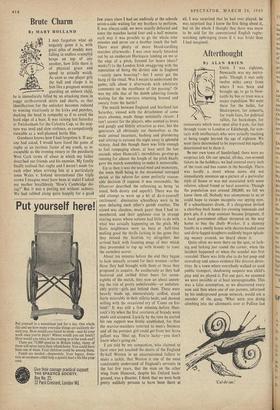Brute Charm
By MARY HOLLAND Goodness knows how I had forgotten it. If any- one had asked, I would have listed the game of rugby as an intrinsic factor of my youth, as in- escapable as the evening rosary or the peculiarly West Cork terms of abuse in Which my father described our friends and his enemies. My family finally realised that rugby and I weren't made for each other when arriving late at a particularly tense Wales v. Ireland international (the triple crown I imagine must have been at stake) I asked my mother breathlessly 'How's Cambridge do- ing?' But it was a parting not without sadness. We had rubbed along quite happily for a good few years since I had sat endlessly at the schools seven-a-side waiting for my brothers to perform. It was always cold, we were usually defeated and since the matches lasted four and a half minutes each way it was possible to go the whole nine minutes and never see a brother touch the ball, There were plenty of more blood-curdling matches afterwards: I was once nearly knocked out by an exuberant Harlequin landing on me at the edge of a pitch, listened for hours (days? weeks?) to the London Irish swaggering with the reputation of being th'e dirtiest side in England —surely mere boasting?—but I never got the hang of the ritual. Was I meant to understand the game, talk about it afterwards with adulatory comments on the excellence of the passing? Or was my role that of the dumb admiring female waiting for the warriors returning bruised and sweaty from the battle?
The match between England and Scotland last Saturday, viewed with the detachment of some years absence, made things minimally clearer. I can't answer for the players, who seemed as brute and gangly and filthily attractive as ever, but the spectators all obviously see themselves as the male animal incarnate, bashing and plundering and retiring to carouse the night away in splendid victory. And this though there was little enough to feel rampaging about, at least until the last seconds when Hancock's incredulous go-stop-go running for almost the length of the pitch finally gave the match something to make it memorable.
Up to then it was the usual mud and monotony, the main thrill being in the occasional outraged shriek at the referee for some perfectly reason- able decision (I suppose it was reasonable; the Observer described the refereeing as being 'as usual, both dainty and superb'). There was the odd attempt to work up a bit of do-it-yourself excitement: diminutive schoolboys were to be seen defacing each other's garish rosettes. The crowd was classless, much gayer than I had re- membered, and their applause rose in strange roaring waves whose volume had little to do with what was actually happening on the pitch. My Scots neighbours were so busy at half-time making good the thrills lacking in the game that they missed the Scottish try altogether, but arrived back with foaming mugs of beer which they proceeded to top up with brandy to toast the nameless scorer. ,
About ten minutes before the end they began to look uneasily around for their women—either those they had brought with them or those they proposed to acquire. As assiduously as they had bantered and swilled bitter beers for seven- eighths of the match, they now set about annex- ing the trio of pretty unbelievable—or unbeliev- ably pretty—girls just behind them. These were heavily made up, immaculately coiffed, stood fairly miserably in their stiletto heels, and showed willing with the occasional cry of 'Come on Ire- land!' It was still a few minutes before Han- cock's try when the first overtures of brandy were made and accepted. Luckily by the time he started his run rapport was firmly established, for then the warrior-watchers reverted to men's business and all the prettiest girl could get from her Scots gallant was 'Shut up. YOu're lucky—you don't know what's going on,'
I am told by my companion, who claimed to have once just touched the shorts of the England fly-half Weston in an unaccustomed failure to make a tackle, that Weston is one of the most consistently underrated of England's servants in the last few years, that the man on the other wing from Hancock, despite his Oxford back- ground, was a disaster. I think that we were both pretty unlikely persons to have been there at all. I was surprised that he had ever played, he was surprised that I knew the first thing about it, but on the whole I thought that there was more to be said for the conventional English rugby- watching upbringing (even if it was Irish) than I had imagined.














































 Previous page
Previous page